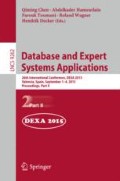Abstract
This paper stems from the work in [10] in which the declarative semantics of a P2P system is defined in terms of minimal weak models. Under this semantics each peer uses its mapping rules to import minimal sets of mapping atoms allowing to satisfy its local integrity constraints. This behavior results to be useful in real world P2P systems in which peers often use the available import mechanisms to extract knowledge from the rest of the system only if this knowledge is strictly needed to repair an inconsistent local database. Then, an inconsistent peer, in the interaction with different peers, just imports the information allowing to restore consistency, that is minimal sets of atoms allowing the peer to enrich its knowledge so that restoring inconsistency anomalies. The paper extends previous work by proposing a rewriting technique that allows modeling a P2P system, \({\mathcal{{PS}}}\), as a unique logic program whose minimal models correspond to the minimal weak models of \({\mathcal{{PS}}}\).
Access this chapter
Tax calculation will be finalised at checkout
Purchases are for personal use only
Notes
- 1.
The syntax of facts, standard rules and mapping rules, here presented in an informal way, will be formally defined in the following section.
- 2.
Assuming that \(max(\emptyset )=false\) and \(min(\emptyset )=true\).
- 3.
A built-in atom is of the form \(X \theta Y\), where X and Y are terms and \(\theta \) is a comparison predicate.
- 4.
The symbol \(\vee \) denotes inclusive disjunction and is different from \(\oplus \) as the latter denotes exclusive disjunction. It should be recalled that inclusive disjunction allows more than one atom to be true while exclusive disjunction allows only one atom to be true.
References
Bernstein, P.A., Giunchiglia, F., Kementsietsidis, A., Mylopulos, J., Serafini, L., Zaihrayen, I.: Data management for peer-to-peer computing: a vision. WebDB 2002, 89–94 (2002)
Brewka, G., Eiter, T.: Preferred answer sets for extended logic programs. Artif. Intell. 109(1–2), 297–356 (1999)
Brewka, G., Niemela, I., Truszczynski, M.: Answer set optimization. In: International Joint Conference on Artificial Intelligence, pp. 867–872 (2003)
Calvanese, D., De Giacomo, G., Lenzerini, M., Rosati, R.: Logical foundations of peer-to-peer data integration. In: PODS Conference, pp. 241–251 (2004)
Caroprese, L., Greco, S., Zumpano, E.: A logic programming approach to querying and integrating P2P deductive databases. In: FLAIRS, pp. 31–36 (2006)
Caroprese, L., Molinaro, C., Zumpano, E.: Integrating and querying P2P deductive databases. In: IDEAS, pp. 285–290 (2006)
Caroprese, L., Zumpano, E.: Consistent data integration in P2P deductive databases. In: Prade, H., Subrahmanian, V.S. (eds.) SUM 2007. LNCS (LNAI), vol. 4772, pp. 230–243. Springer, Heidelberg (2007)
Caroprese, L., Zumpano, E.: Modeling cooperation in P2P data management systems. In: ISMIS, pp. 225-235 (2008)
Caroprese, L., Zumpano, E.: Handling preferences in P2P systems. In: FOIKS, pp. 91–106 (2012)
Caroprese, L., Zumpano, E.: Restoring consistency in P2P deductive databases. In: Hüllermeier, E., Link, S., Fober, T., Seeger, B. (eds.) SUM 2012. LNCS, vol. 7520, pp. 168–179. Springer, Heidelberg (2012)
Delgrande, J.P., Schaub, T., Tompits, H.: A framework for compiling preferences in logic programs. TPLP 3(2), 129–187 (2003)
Franconi, E., Kuper, G.M., Lopatenko, A., Zaihrayeu, I.: A robust logical and computational characterisation of peer-to-peer database systems. In: DBISP2P, pp. 64–76 (2003)
Gribble, S., Halevy, A., Ives, Z., Rodrig, M., Suciu, D.: What can databases do for peer-to-peer? In: WebDB, pp. 31–36 (2006)
Halevy, A., Ives, Z., Suciu, D., Tatarinov, I.: Schema mediation in peer data management systems. In: International Conference on Database Theory, pp. 505–516 (2003)
Madhavan, J., Halevy, A.Y.: Composing mappings among data sources. In: International Conference on Very Large Data Bases, pp. 572–583 (2003)
Sakama, C., Inoue, K.: Prioritized logic programming and its application to commonsense reasoning. Artif. Intell. 123, 185–222 (2000)
Tatarinov, I., Halevy., A.: Efficient query reformulation in peer data management systems. In: SIGMOD, pp. 539–550 (2004)
Author information
Authors and Affiliations
Corresponding author
Editor information
Editors and Affiliations
Rights and permissions
Copyright information
© 2015 Springer International Publishing Switzerland
About this paper
Cite this paper
Caroprese, L., Zumpano, E. (2015). A Logic Based Approach for Restoring Consistency in P2P Deductive Databases. In: Chen, Q., Hameurlain, A., Toumani, F., Wagner, R., Decker, H. (eds) Database and Expert Systems Applications. Globe DEXA 2015 2015. Lecture Notes in Computer Science(), vol 9262. Springer, Cham. https://doi.org/10.1007/978-3-319-22852-5_1
Download citation
DOI: https://doi.org/10.1007/978-3-319-22852-5_1
Published:
Publisher Name: Springer, Cham
Print ISBN: 978-3-319-22851-8
Online ISBN: 978-3-319-22852-5
eBook Packages: Computer ScienceComputer Science (R0)

